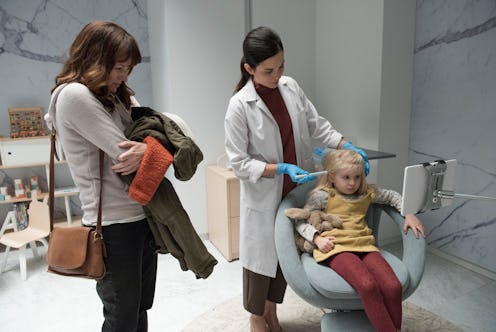Entertainment
This 'Black Mirror' Episode Will Make You See Mother-Daughter Relationships In A Whole New Light

Mother-daughter relationships are plenty complicated already, but add a near-future setting and an experimental technology into the mix, and the result is pretty harrowing. In her turn in Black Mirror Season 4's "Arkangel," Rosemarie DeWitt heightened the techno-paranoia of her stand-alone episode by putting the focus on the familial connection at the heart of the story. The result is particularly dark and devastating, even by Black Mirror standards.
“Arkangel” centers around a woman (DeWitt) who is presented with a new experimental gadget that can help keep her toddler daughter safe. The device gives her peace of mind, and even proves helpful in the case of an emergency, but as her child grows, the effects of the security measures seem to stunt her emotional growth. The privacy boundaries between mother and daughter are tested as she becomes a teenager. As the lack of trust heightens between the two, DeWitt gives a harrowing performance as a flawed mom who wants to do right by her child, but comes short in unsettling ways.
Despite her standout performance, DeWitt had never seen Black Mirror, Netflix’s computer-age answer to the Twilight Zone, prior to being cast. “I’m embarrassed to say that and I blame it on toddlers, because I have a two year-old and a four year-old,” she tells Bustle over the phone. When she did get around to watching a few episodes, she says was impressed with the anthology series, yet she didn’t want to binge it because she had her own ideas for where her story should go.
"I didn't want to have [previous episodes] too much in my head, because our episode is very different from a lot of high concept ones," DeWitt says. "It was so close to the near future that I just wanted to sort of go off and make it like an indie film, which I think is how we approached it."
It helped that director Jodie Foster was also on board for this approach. Foster was the one who sent DeWitt the script, and her involvement with the project sealed the deal for DeWitt. “For me the leaping off point is just to work with Jodie, the prospect of that was so exciting,” DeWitt says. For the director and lead actor, who are both mothers, it was imperative to get the mother-daughter relationship right to make it real.
“There's a different relationship between mothers and daughters than fathers and daughters and mothers and sons, and I felt like we were really looking at those kinds of nuances," DeWitt says. "Sometimes mothers and daughters don't know where one begins and where the other one ends — the veil between the two can be a little blurry, because you kind of define yourself as a woman through your mother's example.”
To make the story's specific relationship seem nuanced and real, DeWitt spoke frequently with Foster. Despite being a mother of two young children, she felt at a loss when it came to interacting with teenagers. “I had to rely on Jodie, who had just sent her son off to college,” she explains. Foster, in turn, also used DeWitt’s compassion for the characters she plays to the project’s benefit, welcoming some light friction on the set.
“I feel like I'm always lawyering up for my character,” DeWitt says. “I'm always trying to bring as much humanity and depth and empathy [as possible]. I'm always trying to approach a character with that, but I felt sometimes Jodie was pulling for the character of my daughter, and it was good because it created this great tension where we were trying to be fair to both of them.”
DeWitt’s thoughtfulness about the process of creating was apparent, and for good reason — she admits that in the future she would like to possibly follow Foster’s footsteps and work behind the camera on her own project.
“I feel like it's a great time to tell more female-driven stories, like real ones, not girlfriends in hot pants, I mean real thoughtful stories about mature women,” DeWitt says. To her, the #MeToo movement both reflects a problem in Hollywood and an opportunity to strike when people are listening to women. “It feels like more women want to tell stories that are personal to them, and maybe we're at a moment in time where people want to hear them,” she adds.
While DeWitt was quick to point out that it's been a good year for women's stories on screen, she pointed to the general lack of middle-aged and older women with major roles. A recent study revealed that 80 percent of acting roles for characters over 40 went to male actors. “It feels like now is a good time to be sitting down with pad and paper and putting them together,” she says.
So what comes next? Partially inspired by working with Foster and the #MeToo movement, DeWitt is ready to take charge of more projects on her own. “Instead of being a gun for hire, I'm definitely wanting to collaborate more with people I know,” DeWitt says. “I don't know in what capacity. I don't know if I want to sit with a writer or if I want to direct it, but it just feels like if you don't sit down and do it, no one is going to.”